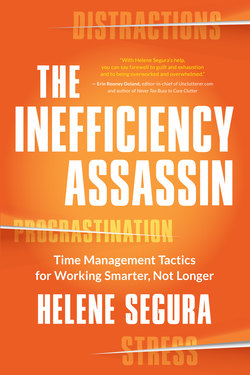Читать книгу The Inefficiency Assassin - Helene Segura - Страница 15
На сайте Литреса книга снята с продажи.
Оглавление6 Rendezvous: Your Date with Change…and Discomfort
When my client Julie (the one who had kept working right through her son’s first home run, completely missing that special moment) tried implementing some of these steps you and I’ve been talking about, she confessed that she felt, well, a little uncomfortable. She said, “I feel strange talking about all this clarity stuff. That’s a little woo-woo for me. And pausing to breathe? Who does that stuff?”
She also commented that it felt “different” to pause to look at her lists of priorities and targets before she made a decision about how she would use her time. She’d tried doing that for two days, but she wasn’t used to it. It felt odd. So she stopped.
I asked her how she had felt when she missed Ben’s home run. “Terrible,” she muttered.
Discontent is the first necessity of progress.
— Thomas Edison
“Do you want to keep doing what you’re doing and miss more special moments?”
“No!”
“So if you don’t want to keep doing what you’re doing, what needs to happen?”
She paused, took a deep breath, and said, “I need to… change.”
GOAL
Acknowledge the discomfort you’ll feel, and try at least one change that I recommend in this book for at least three weeks.
TACTICS
1. Recognize when you feel uncomfortable about trying something new.
2. Rejoice in the fact that you feel discomfort. It means you’re taking forward steps in making a change!
3. Include reflecting on this change — trying out this new strategy or tactic — during your weekly reflect-with-power session.
4. Try out the new strategy or tool for at least three weeks before you consider throwing in the towel.
STRATEGY
Change.
People try it and give up when the first steps toward it don’t go smoothly.
People fear it because they’re not sure about what they’re doing, or they’re not sure if they’ll do it right.
People avoid it because they feel discomfort in doing something different from the norm.
All progress takes place outside the comfort zone.
—Attributed to Michael John Bobak
Discomfort is an abstract feeling, so Julie and other clients have found it hard to describe not only what it felt like, but also what was causing this odd feeling. They just knew that they felt different when implementing new strategies and tactics, so they stopped these new procedures after only a couple of days. Purely because it felt different. And — in the beginning — they went right back to their old ways.
Change seldom happens overnight. Rather, it’s something you struggle with initially because it feels different; it feels unnatural because you can’t be on autopilot, and you have to remind yourself to do it. You have to push through because if you don’t keep up the discipline to do it, you’ll go back to your old but comfortable routines — and unsuccessful ways. Change can be a tedious process because it takes effort to form a new habit. This may take weeks. And for some habits, even longer.
I’d like to tell you a little secret:
Change can be scary, but when you march through a transformation you’ve determined to begin, and then you succeed, it feels remarkably empowering. It’s an accomplishment. You looked fear of the unknown in the face and kicked its bootay!
Instead of being comfortable with shying away from change, try craving the feeling of accomplishment. Instead of allowing the fear of change to dominate your outlook, focus on the desire to feel the success of following through with this change.
It’s all in your head.
It’s human nature to stay in a groove — even a bad one — because we’ve become comfortable in those ways. The minute we try something different, our brains go into a bit of a panic mode because we’ve left that comfort zone. So if you feel a little discomfort from walking off your problems, taking deep breaths, and making decisions based on your priorities, I congratulate you! That’s awesome! It means that change is happening.
As you implement the productivity strategies and tactics in this handbook, recognize the discomfort you might feel from trying something new — and celebrate it!
The discomfort you might feel means you’re taking a step forward. Do a little happy dance because implementing these strategies and tactics we’re discussing during our sessions together will help your brain to maintain clarity and make better decisions about how to use your time.
NEXT STEPS
Julie faced her discomfort and celebrated each day that she implemented her positive changes. She realized that she was more successful when she implemented only one or two changes at a time, so she stuck to that method.
PLOT YOUR NEXT STEPS
• Do you feel any discomfort from trying to change?
• If so, how will you work through it?
• What will your reward be for getting through the change?
